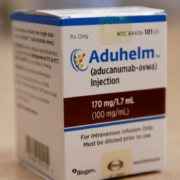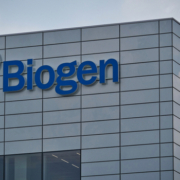BioSpace takes a look at some of the top stories from day one of the Annual Biomarkers for Alzheimer’s Disease Summit held August 25-26, 2021.
The U.S. Veterans Health Administration will not include Aduhelm, the $56,000-a-year Alzheimer’s drug made by Biogen Inc. and Eisai Co. Ltd., on the VHA’s list of approved products due to a lack of evidence that the medicine is effective as well as safety concerns, the agency said on Aug. 11.
Massachusetts-based biotechnology firm Biogen and its Tokyo-based partner Eisai are seeking a speedy approval from the U.S. Food and Drug Administration for a second Alzheimer’s disease drug, lecanemab.
Biogen Inc. and partner Eisai Co. Ltd. on July 29 revealed the design of an upcoming study of their controversial Alzheimer’s treatment, Aduhelm.
Biogen reportedly withdrew a paper that analyzed data from the clinical trials of the Alzheimer’s drug Aduhelm that the company submitted to JAMA after the medical journal requested edits before publication.
One of the eagerly anticipated presentations at the 2021 Alzheimer’s Association International Conference in Denver and virtually is Biogen and the company’s partner Eisai on their controversial drug Aduhelm (aducanumab). Biogen is also presenting new data on a different Alzheimer’s drug with another partner, Ionis Pharmaceuticals.
BioSpace takes a look at some of the stories from the first day of the Alzheimer’s Association International Conference 2021 (AAIC).
Switzerland-based Roche is in talks with the U.S. Food and Drug Administration over the company’s Alzheimer’s drug candidate gantenerumab, which is being evaluated in clinical studies with a large-scale Phase III trial expected to wrap in the second half of 2022.
Anthem Inc. is closely watching for guidance from the U.S. Food and Drug Administration and all available clinical evidence on Biogen Inc.’s Aduhelm to determine the health insurance provider’s coverage policy on the newly approved Alzheimer’s drug.
Biogen Alzheimer’s drug hits roadblocks with some hospitals, insurers
Alzheimer’s disease, Centers for Medicare and Medicaid Services (CMS), Cleveland Clinic, Health Insurers, Hospitals, Medical Experts, Medicare, Mount Sinai, Neurologists, Therapeutics, U.S. Institute for Clinical and Economic Review (ICER)Biogen Inc.’s Alzheimer’s drug, the first new treatment for the memory-robbing disease in nearly 20 years, hit new barriers on July 15 with some large hospitals declining to use Aduhelm and health insurers delaying a decision while awaiting coverage terms from Medicare.










